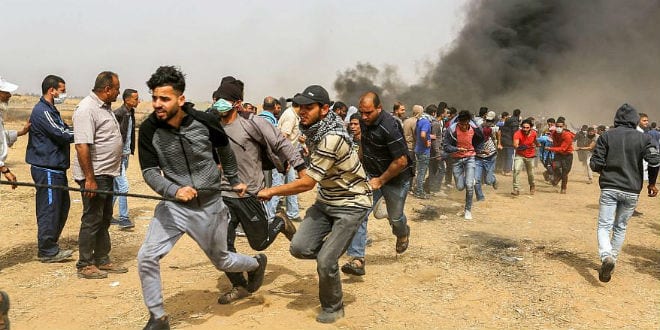For the past year, Hamas has led Palestinians to demonstrate and riot on Fridays along the Gaza-Israel fence. The civilians, of which there are many, provide cover for rocket and incendiary device-wielding terrorists and those who would cross the fence into Israel. This Saturday, Hamas is calling for increased numbers at the fence building up to a massive demonstration on Friday 15 May.
Look past it.
This is a diversion from the active Palestinian revolt against Hamas. The people are complaining about dire living conditions, the brutal nature of Hamas rule, and the high living of Hamas officials. One brave woman told a journalist, “Hamas officials’ children drive in luxurious cars, but I have four unemployed sons. All of Gaza are unemployed because of [leaders] Haniyeh & Sinwar. These officials care nothing about the poor people’s necessities.”
Some people have cried, “We want to live!” Others said, “I have nothing to live for.”
Several reporters were arrested and brutally beaten (three were hospitalized) for covering the demonstrations, and the Palestinian news agency WAFA reported that masked Hamas police were raiding homes and arresting hundreds of people. There is video of the brutal nature of the Hamas crackdown and the firing of live ammunition.
An Arab civilian rebellion against a repressive Arab government calls to mind the “Arab Spring,” a fleeting moment of hope in a long and ultimately unhappy saga of nasty governance.
Eight years ago, a Tunisian vegetable vender with an illegal cart was being harassed by a female policeman. It was a perfect storm of money, sex, and humiliation for the man, who set himself on fire. As the rebellion against economic privation, repressive rule, and wealthy rulers spread, the West naively believed the post-colonial Arab world was ready to take on the social and political norms of 21st century Europe or America.
But the Arab Spring failed.
Arab or Islamist governments in Tunisia, Egypt, Libya, Iraq, and Afghanistan either fell or were overthrown. All were replaced with variants of autocratic, jihadist, kleptocratic thuggery. Syria and Yemen have promulgated and undergone horrific, criminal wars; Bahrain and Jordan are under pressure; Turkey and Lebanon have backslid into terror and jihad-supporting dictatorships.
The Palestinians should be different. For 25-plus years, since the Oslo Accords endowed the Palestinian Authority with governance over people of the West Bank and Gaza, the United States and European Union have lavished political power, attention, money, and infrastructure projects on this fraction of the Arab people. The Palestinians as a group were well-educated, secular, entrepreneurial, and tens of thousands of Palestinians had worked in Israel, a 21st-century economic success. If there was a test-bed for the construction of Western-style Arab democracy, this should be it.
It was not to be.
In 2017, just before leaving office, the Obama administration participated in a French-led conclave devoted to the Israeli-Palestinian “peace process.” In the final communique, the parties “expressed their readiness to exert necessary efforts… in particular in the areas of political and economic incentives, the consolidation of Palestinian state capacities, and civil society dialogue.” Those could include:
“A European privileged partnership; other political and economic incentives and increased private sector involvement… continued financial support to the PA in building the infrastructure for a viable Palestinian economy;
“Supporting and strengthening Palestinian steps to exercise their responsibilities of statehood through consolidating their institutions and institutional capacities, including for service delivery;
“Convening Israeli and Palestinian civil society fora, in order to enhance dialogue between the parties, rekindle the public debate and strengthen the role of civil society…”
In other words, after decades and billions, the Palestinians still lacked “infrastructure for a viable… economy,” and could not manage “service delivery,” or “exercise the responsibilities of statehood.” And there was no “civil society” to speak of.
Unable to come to terms either with Israel’s existence or with the West Bank-based Palestinian Authority, Gaza is a pit of its own making. The PA squeezes Gaza financially and money from Western charities is siphoned off for weapons and terror tunnels. Israel takes up some of the slack, but violence against Israel is part of the Hamas raison d’etre. Riots, arson, rocket and terror attacks quite reasonably limit Israel’s willingness to be generous.
By announcing “special” demonstrations at the Gaza fence this week, Hamas hopes to focus its people away from the disaster of its rule and back onto an external enemy. Israel.
The rebellion continues, but Hamas is far from being overthrown. If it is — due in no small measure to brave individuals willing to risk it all for a better life — then recent experience suggests that the next Palestinian government will be no better than the present one.
Reprinted with author’s permission from Jewish Policy Center
Source: Israel in the News


